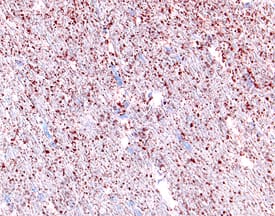



 下载产品说明书
下载产品说明书 下载SDS
下载SDS 用小程序,查商品更便捷
用小程序,查商品更便捷



 收藏
收藏
 对比
对比 咨询
咨询



Ser122-Gly241
Accession # P25427

Scientific Data
 View Larger
View Largerbeta -NGF in Rat Brain. beta -NGF was detected in perfusion fixed frozen sections of rat brain using Rat beta -NGF Antigen Affinity-purified Polyclonal Antibody (Catalog # AF-556-NA) at 15 µg/mL overnight at 4 °C. Tissue was stained using the Anti-Goat HRP-AEC Cell & Tissue Staining Kit (red; Catalog # CTS009) and counterstained with hematoxylin (blue). View our protocol for Chromogenic IHC Staining of Frozen Tissue Sections.
 View Larger
View LargerCell Proliferation Induced by beta ‑NGF and Neutralization by Rat beta ‑NGF Antibody. Recombinant Rat beta -NGF (Catalog # 556-NG) stimulates proliferation in the TF-1 human erythroleukemic cell line in a dose-dependent manner (orange line). Proliferation elicited by Recombinant Rat beta -NGF (3 ng/mL) is neutralized (green line) by increasing concentrations of Rat beta -NGF Antigen Affinity-purified Polyclonal Antibody (Catalog # AF-556-NA). The ND50 is typically 0.02-0.1 µg/mL.
Rat beta-NGF Antibody Summary
Ser122-Gly241
Accession # P25427
Applications
Rat beta -NGF Sandwich Immunoassay
Please Note: Optimal dilutions should be determined by each laboratory for each application. General Protocols are available in the Technical Information section on our website.

Background: beta-NGF
NGF was initially isolated in the mouse submandibular gland over three decades ago as a 7S complex composed of three non-covalently linked subunits, alpha, beta, and gamma. It is now known that both the alpha and gamma subunits of NGF are members of the kallikrein family of serine proteases while the beta subunit, called beta -NGF or 2.5S NGF, exhibits all the biological activities ascribed to NGF. Recombinant rat beta -NGF is a homodimer of two 120-amino acid polypeptides. The human protein shares approximately 90% homology at the amino acid level with both the mouse and rat beta -NGF and exhibits cross-species activity.
NGF is a well-characterized neurotrophic protein that plays a critical role in the development of sympathetic and some sensory neurons in the peripheral nervous system. In addition, NGF can also act in the central nervous system as a trophic factor for basal forebrain cholinergic neurons. NGF has also been shown to have biological effects on non-neuronal tissues. NGF is mitogenic for a factor-dependent human erythroleukemic cell line, TF-1. NGF has been found to increase the number of mast cells in neonatal rats and to induce histamine release from peritoneal mast cells. NGF will enhance histamine release and strongly modulate the formation of lipid mediators by basophils in response to various stimuli. NGF will also induce the growth and differentiation of human B lymphocytes as well as suppress apoptosis of murine peritoneal neutrophils. These results, taken together, suggest that NGF is a pleiotropic cytokine which, in addition to its neurotropic activities, may have an important role in the regulation of the immune system.


Preparation and Storage
- 12 months from date of receipt, -20 to -70 °C as supplied.
- 1 month, 2 to 8 °C under sterile conditions after reconstitution.
- 6 months, -20 to -70 °C under sterile conditions after reconstitution.
参考图片
beta -NGF in Rat Brain. beta -NGF was detected in perfusion fixed frozen sections of rat brain using Rat beta -NGF Antigen Affinity-purified Polyclonal Antibody (Catalog # AF-556-NA) at 15 µg/mL overnight at 4 °C. Tissue was stained using the Anti-Goat HRP-AEC Cell & Tissue Staining Kit (red; Catalog # CTS009) and counterstained with hematoxylin (blue). View our protocol for Chromogenic IHC Staining of Frozen Tissue Sections.
Cell Proliferation Induced by beta ‑NGF and Neutralization by Rat beta ‑NGF Antibody. Recombinant Rat beta ‑NGF (Catalog # 556-NG) stimulates proliferation in the TF‑1 human erythroleukemic cell line in a dose-dependent manner (orange line). Proliferation elicited by Recombinant Rat beta ‑NGF (10 ng/mL) is neutralized (green line) by increasing concentrations of Rat beta -NGF Antigen Affinity-purified Polyclonal Antibody (Catalog # AF-556-NA). The ND50 is typically 0.02-0.1 µg/mL.






 危险品化学品经营许可证(不带存储) 许可证编号:沪(杨)应急管危经许[2022]202944(QY)
危险品化学品经营许可证(不带存储) 许可证编号:沪(杨)应急管危经许[2022]202944(QY)  营业执照(三证合一)
营业执照(三证合一)